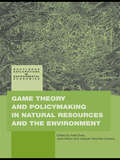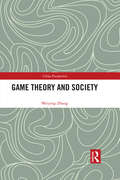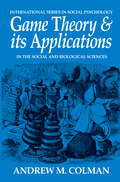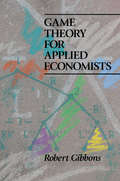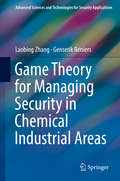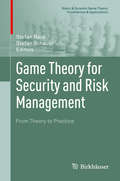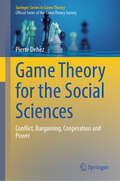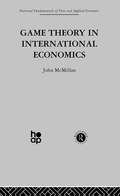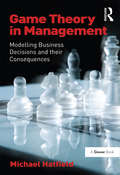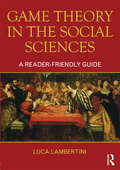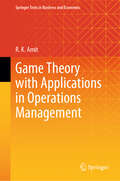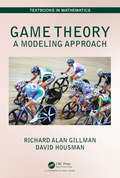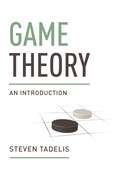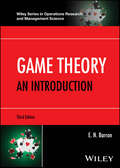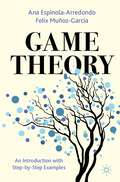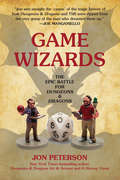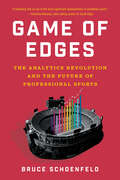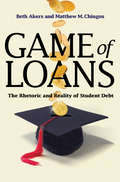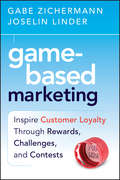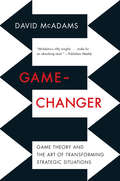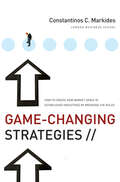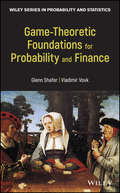- Table View
- List View
Game Theory and Policy Making in Natural Resources and the Environment (Routledge Explorations in Environmental Economics)
by Ariel Dinar José Albiac Joaquín Sánchez-SorianoGame Theory has become one of the main analytical tools for addressing strategic issues in the field of economics and is increasing its influence in other fields of social sciences. With the increased level of extraction of natural resources and pollution of environments, game theory gains its place in the literature and it is more and more seen as a tool for policy makers and not only for theoreticians. The book is structured into four parts dealing with the management of natural resources, the negotiation aspects of water management, water allocation through pricing and markets, and how conflicts and regulation shape the management of the environment. The first part explores game theory concepts applied to fisheries and grazing lands, which are two important natural resources. In the next two parts, several game theory methodologies are considered in the negotiation approach to water management and approaches to water pricing and markets. The last section looks at environmental protection as the end process of the interplay between conflict and regulation. This book includes chapters by experts from developing and developed countries that apply game theory to actual issues in natural resources and the environment. As such the book is extremely useful for graduate students and technical experts interested in the sustainable management of natural resource and the environment. It is also relevant to all Game Theory and Environmental Economics students.
Game Theory and Society (China Perspectives)
by Weiying ZhangThe progress of society can only happen through interpersonal cooperation, because only cooperation can bring about mutual benefit, thus bringing happiness to each person. This should be our collective rationality, but we often see it conflicts with individual interests, which leads to the so-called "Prisoners’ Dilemma" and does not bring happiness to all. From a game theoretical perspective, this book addresses the issue of how people can cooperate better. It has two objectives. The first is to use common language to systematically introduce the basic methodologies and core conclusions of Game Theory, including the Nash equilibrium, multiple equilibriums, dynamic games, etc. Mathematics and theoretical models are used to the minimum necessary scope too, to make this book get access to ordinary readers with elementary mathematical training. The second objective is to utilize these methods and conclusions to analyze various Chinese social issues and institutional arrangements, with a focus on the reasons people exhibit non-cooperative behaviors as well as the institutions and cultures that promote interpersonal cooperation. In addition to economics, specialists in sociology, law, history, politics and management will also be attracted by this book for its insightful analysis on the issue of cooperation in these fields. Also, readers curious about Chinese society will benefit from this book.
Game Theory and its Applications: In the Social and Biological Sciences
by Andrew M. ColmanAndrew Coleman provides an accessible introduction to the fundamentals of mathematical gaming and other major applications in social psychology, decision theory, economics, politics, evolutionary biology, philosophy, operational research and sociology.
Game Theory and its Applications: In the Social and Biological Sciences (International Series In Social Psychology Ser.)
by Andrew M. ColmanAndrew Coleman provides an accessible introduction to the fundamentals of mathematical gaming and other major applications in social psychology, decision theory, economics, politics, evolutionary biology, philosophy, operational research and sociology.
Game Theory for Applied Economists
by Robert S. GibbonsThis book introduces one of the most powerful tools of modern economics to a wide audience: those who will later construct or consume game-theoretic models. Robert Gibbons addresses scholars in applied fields within economics who want a serious and thorough discussion of game theory but who may have found other works overly abstract. Gibbons emphasizes the economic applications of the theory at least as much as the pure theory itself; formal arguments about abstract games play a minor role. The applications illustrate the process of model building--of translating an informal description of a multi-person decision situation into a formal game-theoretic problem to be analyzed. Also, the variety of applications shows that similar issues arise in different areas of economics, and that the same game-theoretic tools can be applied in each setting. In order to emphasize the broad potential scope of the theory, conventional applications from industrial organization have been largely replaced by applications from labor, macro, and other applied fields in economics. The book covers four classes of games, and four corresponding notions of equilibrium: static games of complete information and Nash equilibrium, dynamic games of complete information and subgame-perfect Nash equilibrium, static games of incomplete information and Bayesian Nash equilibrium, and dynamic games of incomplete information and perfect Bayesian equilibrium.
Game Theory for Managing Security in Chemical Industrial Areas (Advanced Sciences and Technologies for Security Applications)
by Genserik Reniers Laobing ZhangThis book systematically studies how game theory can be used to improve security in chemical industrial areas, capturing the intelligent interactions between security managers and potential adversaries. The recent unfortunate terrorist attacks on critical infrastructures show that adversaries are intelligent and strategic. Game theoretic models have been extensively used in some domains to model these strategic adversaries. However, there is a lack of such advanced models to be employed by chemical security managers. In this book, game theoretic models for protecting chemical plants as well as clusters are proposed. Different equilibrium concepts are explored, with user-friendly explanation of how to reflect them to realistic cases. Based on efficient analysis of the properties of security issues in chemical plants/clusters, models in this book are capable to support resources allocations, cost-effectiveness analysis, cooperation incentives and alike.
Game Theory for Security and Risk Management: From Theory to Practice (Static & Dynamic Game Theory: Foundations & Applications)
by Stefan Rass Stefan SchauerThe chapters in this volume explore how various methods from game theory can be utilized to optimize security and risk-management strategies. Emphasizing the importance of connecting theory and practice, they detail the steps involved in selecting, adapting, and analyzing game-theoretic models in security engineering and provide case studies of successful implementations in different application domains. Practitioners who are not experts in game theory and are uncertain about incorporating it into their work will benefit from this resource, as well as researchers in applied mathematics and computer science interested in current developments and future directions.The first part of the book presents the theoretical basics, covering various different game-theoretic models related to and suitable for security engineering. The second part then shows how these models are adopted, implemented, and analyzed. Surveillance systems, interconnected networks, and power grids are among the different application areas discussed. Finally, in the third part, case studies from business and industry of successful applications of game-theoretic models are presented, and the range of applications discussed is expanded to include such areas as cloud computing, Internet of Things, and water utility networks.
Game Theory for the Social Sciences
by Herve MoulinThe second edition of Herve Moulin's highly successful book outlines the fundamental concepts of game theory-one of the most provocative and fruitful applications of mathematics to the human sciences-and demonstrates its uses in economic and political discourse. Thoroughly revised, and now published with an accompanying workbook of 89 exercises, this rigorous yet accessible test explains the uses of game theory in largely nontechnical terms. Moulin carefully discusses the behavioral scenarios underlying the various equilibrium concepts. He provides a self-contained exposition of basic equilibrium concepts for strategic games: perfect (sophisticated) equilibrium, Nash's noncooperative example, Aumann's strong and correlated example, and several versions of the core. The author is concerned less with mathematical refinements than with helping the reader understand the strategic stories backing these concepts. HIs examples therefore give a fair account of the current game models used in economics, politics, and sociology. Addressed here are oligopoly theory, the provision of public gtoods, auctions, voting procedures, and cost allocation problems, as well as the classic prisoner's dilemma, tic-tac-toe, and Marienbad games. Extremely popular in its original French edition and in its first English version, Moulin's excellent introductory text is now, more than ever, the book to answer the essential questions about the application of game theory to the social sciences.
Game Theory for the Social Sciences: Conflict, Bargaining, Cooperation and Power (Springer Series in Game Theory)
by Pierre DehezThis textbook introduces fundamental concepts of game theory and demonstrates its uses and application in the social sciences. Written in plain English and without overwhelming mathematical jargon, it serves as an invaluable resource for undergraduate students in economics, law, political sciences, and related social sciences. Starting from non-cooperative games and progressing to cooperative games, it explores a wide range of topics, including the analysis of zero-sum games, voting rules and their practical implications, and other applications of game theory. Uniquely, it emphasizes cooperative concepts and their normative applications, providing a fresh perspective. With "Game Theory for the Social Sciences", readers will be equipped with the analytical tools to analyze conflict resolution, bargaining strategies, cooperative decision-making, and the dynamics of power relationships. Through engaging examples drawn from real-world scenarios, readers will develop a solid understanding of how game theory can be applied to diverse fields in social sciences. “Pierre Dehez offers a consistent kit of classic game theoretic tools, from equilibrium concepts to bargaining solutions and power indices, all illustrated with insightful examples and applications.” Françoise Forges, Professor of Economics, Université Paris Dauphine-PSL “This book is written clearly and pedagogically without resorting to difficult mathematics. It provides many different and interesting examples from problems of fair sharing, bargaining to voting systems and many others. It is a perfect introduction to this subject too often quoted but too often misunderstood.” Alan Kirman, Directeur d’études, Ecole des Hautes Etudes en Sciences Sociales, Paris, and Emeritus Professor, Aix-Marseille University
Game Theory in International Economics (Fundamentals Of Pure And Applied Economics Ser. #Vol.1, Pt. 1)
by J. McMillanThis book gives an early demonstration of applications of game theory to international economics - applications that were to transform this area during the 1990s.
Game Theory in Management: Modelling Business Decisions and their Consequences
by Michael HatfieldArchitects and engineers can build models to test their ideas - why not managers? In Game Theory in Management: Modelling Business Decisions and Their Consequences, author Michael Hatfield presents a series of mathematically structured analogies to real-life business and economic interaction scenarios, and then, using modern game theory, he shows how to test common managerial technical approaches for their effectiveness. His results are astonishing: if game theory is correct then many commonly-held and taught management approaches and techniques are not only less effective than thought, they are actually detrimental in many areas where they are held to be beneficial. Game Theory in Management also examines managerial implications from network theory, cartage schemes, risk management theory, management information system epistemology, and other areas where the quantification and testing of business decisions can be employed to identify winning and losing stratagems.
Game Theory in the Social Sciences: A Reader-friendly Guide
by Luca LambertiniIndividuals, firms, governments and nations behave strategically, for good and bad. Over the last few decades, game theory has been constructed and progressively refined to become the major tool used by social scientists to understand, predict and regulate strategic interaction among agents who often have conflicting interests. In the surprisingly anodyne jargon of the theory, they ‘play games’. This book offers an introduction to the basic tools of game theory and an overview of a number of applications to real-world cases, covering the areas of economics, politics and international relations. Each chapter is accompanied by some suggestions about further reading.
Game Theory with Applications in Operations Management (Springer Texts in Business and Economics)
by R. K. AmitThis book provides a broad picture of solution concepts that are highly applicable to operations and supply chain settings and to explicate these concepts with some of the relevant problems in operations management in multi-agent settings. It discusses different strategic situations like games in normal form, games in extensive form, games of incomplete information, mechanism design, and cooperative games, to solve operations problems of supply chain coordination, capacity planning, revenue and pricing management, and other complex problems of matching supply with demand. The recognition and adoption of game-theoretic modeling for operations and supply chain management problems in multi-agent settings have been a hallmark of operations and supply chain literature research during the last few years. Despite research in operations and supply chain management having embraced both non-cooperative and cooperative game-theoretic solution concepts, there is still an abundance of underutilized concepts and tools in game theory that could strongly influence operations management problems. Additionally, with the increasing digitization of operations and supply chain management, the narrative of problems in these areas focuses on blockchain and smart contracts, platforms, and shared economy. The book profits from these new issues being predominantly multi-agent settings and lending themselves to game-theoretical solution concepts. The book's intended audience is the advanced undergraduate and graduate student community of operations and supply chain management, economics, mathematics, computer science, and industrial engineering. It is also relevant for the research community and industry practitioners who use multi-agent architecture in business problems.
Game Theory: A Modeling Approach (Textbooks in Mathematics)
by Richard Alan Gillman David HousmanGame Theory: A Modeling Approach quickly moves readers through the fundamental ideas of the subject to enable them to engage in creative modeling projects based on game theoretic concepts. The authors match conclusions to real-world scenarios and applications. The text engages students in active learning, group work, in-class discussions and interactive simulations. Each chapter provides foundation pieces or adds more features to help readers build game theoretic models. The chapters include definitions, concepts and illustrative examples. The text will engage and challenge both undergraduate and graduate students. Features: Enables readers to apply game theorty to real-world scenarios Chapters can be used for core course materials or independent stuides Exercises, included at the end of the chapters, follow the order of the sections in the text Select answers and solutions are found at the end of the book Solutions manual for instructors is available from the authors
Game Theory: An Introduction
by Steven TadelisThe definitive introduction to game theoryThis comprehensive textbook introduces readers to the principal ideas and applications of game theory, in a style that combines rigor with accessibility. Steven Tadelis begins with a concise description of rational decision making, and goes on to discuss strategic and extensive form games with complete information, Bayesian games, and extensive form games with imperfect information. He covers a host of topics, including multistage and repeated games, bargaining theory, auctions, rent-seeking games, mechanism design, signaling games, reputation building, and information transmission games. Unlike other books on game theory, this one begins with the idea of rationality and explores its implications for multiperson decision problems through concepts like dominated strategies and rationalizability. Only then does it present the subject of Nash equilibrium and its derivatives.Game Theory is the ideal textbook for advanced undergraduate and beginning graduate students. Throughout, concepts and methods are explained using real-world examples backed by precise analytic material. The book features many important applications to economics and political science, as well as numerous exercises that focus on how to formalize informal situations and then analyze them.Introduces the core ideas and applications of game theoryCovers static and dynamic games, with complete and incomplete informationFeatures a variety of examples, applications, and exercisesTopics include repeated games, bargaining, auctions, signaling, reputation, and information transmissionIdeal for advanced undergraduate and beginning graduate studentsComplete solutions available to teachers and selected solutions available to students
Game Theory: An Introduction (Wiley Series in Operations Research and Management Science #1)
by E. N. BarronAuthoritative and quantitative approach to modern game theory with applications from areas including economics, political science, computer science, and engineering Game Theory acknowledges the role of mathematics in making logical and advantageous decisions in adversarial situations and provides a balanced treatment of the subject that is both conceptual and applied. This newly updated and revised Third Edition streamlines the text to introduce readers to the basic theories behind games in a less technical but still mathematically rigorous way, with many new real-world examples from various fields of study, including economics, political science, military science, finance, biological science, and general game playing. The text introduces topics like repeated games, Bayesian equilibria, signaling games, bargaining games, evolutionary stable strategies, extensive games, and network and congestion games, which will be of interest across a wide range of disciplines. Separate sections in each chapter illustrate the use of Mathematica and Gambit software to create, analyze, and implement effective decision-making models. A companion website contains the related Mathematica and Gambit data sets and code. Solutions, hints, and methods used to solve most problems to enable self-learning are in an Appendix. Game Theory includes detailed information on: The von Neumann Minimax Theorem and methods for solving any 2-person zero sum matrix game. Two-person nonzero sum games solved for a Nash Equilibrium using nonlinear programming software or a calculus method. Nash Equilibria and Correlated Equilibria. Repeated games and punishment strategies to enforce cooperation Games in Extensive Form for solving Bayesian and perfect information games using Gambit. N-Person nonzero sum games, games with a continuum of strategies and many models in economics applications, duels, auctions, of Nash Equilibria, and the Stable Matching problem Coalitions and characteristic functions of cooperative games, an exact nucleolus for three-player games, bargaining Game theory in evolutionary processes and population games A trusted and proven guide for students of mathematics, engineering, and economics, the Third Edition of Game Theory is also an excellent resource for researchers and practitioners in economics, finance, engineering, operations research, statistics, and computer science.
Game Theory: An Introduction with Step-by-Step Examples
by Felix Muñoz-Garcia Ana Espinola-ArredondoAn introduction to game theory, complete with step-by-step tools and detailed examples. This book offers condensed breakdowns of game-theory concepts. Specifically, this textbook provides “tools” or “recipes” to solve different classes of games. Game Theory presents the information as plainly and clearly as possible. Every chapter begins with the main definitions and concepts before diving into the applications to different settings across economics, business, and other social sciences. Chapters walk readers through algebraic steps and simplifications. This makes the text accessible for undergraduate and Masters-level students in economics and finance. Paired with the exercises published on the accompanying website, students will improve both their theoretical and practical understandings of game theory. Readers will walk away from this book understanding complete and incomplete information models as well as signaling games.
Game Time Decision for AppDirect
by Andrei Hagiu Emily Zhang Laura ArjonaAppDirect is a start-up that offers small businesses software-as-a-service solutions through a business app marketplace and portal. Daniel Saks, cofounder and co-CEO, is faced with the key question of deciding distribution strategy: should AppDirect find channel partners or create a self-branded platform? The case describes the evolving business app market by analyzing the strategies and business models of competitors for both the marketplace and portal products. The marketplace offers small businesses search, trial, and purchase of software-as-a-service apps for a wide range of business needs, from customer management to human resources, while the portal service gives businesses the ability to manage all their apps in one place, from user management to single sign-on. The case encourages discussion on the evolution and future direction of this nascent market.
Game Wizards: The Epic Battle for Dungeons & Dragons (Game Histories)
by Jon PetersonThe story of the arcane table-top game that became a pop culture phenomenon and the long-running legal battle waged by its cocreators.When Dungeons & Dragons was first released to a small hobby community, it hardly seemed destined for mainstream success--and yet this arcane tabletop role-playing game became an unlikely pop culture phenomenon. In Game Wizards, Jon Peterson chronicles the rise of Dungeons & Dragons from hobbyist pastime to mass market sensation, from the initial collaboration to the later feud of its creators, Gary Gygax and Dave Arneson. As the game's fiftieth anniversary approaches, Peterson--a noted authority on role-playing games--explains how D&D and its creators navigated their successes, setbacks, and controversies.Peterson describes Gygax and Arneson's first meeting and their work toward the 1974 release of the game; the founding of TSR and its growth as a company; and Arneson's acrimonious departure and subsequent challenges to TSR. He recounts the "Satanic Panic" accusations that D&D was sacrilegious and dangerous, and how they made the game famous. And he chronicles TSR's reckless expansion and near-fatal corporate infighting, which culminated with the company in debt and overextended and the end of Gygax's losing battle to retain control over TSR and D&D.With Game Wizards, Peterson restores historical particulars long obscured by competing narratives spun by the one-time partners. That record amply demonstrates how the turbulent experience of creating something as momentous as Dungeons & Dragons can make people remember things a bit differently from the way they actually happened.
Game of Edges: The Analytics Revolution And The Future Of Professional Sports
by Bruce Schoenfeld“A sweeping look at one of the most significant developments in worldwide sports.” —Christine Brennan, best-selling author of Inside Edge The story of how a new generation of tech-savvy franchise owners is reshaping every aspect of professional sports. In the last two decades, innovation, data analysis, and technology have driven a tectonic shift in the sports business. Game of Edges is the story of how sports franchises evolved, on and off the field, from raggedly run small businesses into some of the most systematically productive companies around. In today’s game, everyone from the owners to the marketing staff are using information—data—to give their team an edge. For analysts, an edge is their currency. Figuring out that bunting hurts your offense? That’s an edge. So is discovering metrics that can predict the career arc of your free agent shooting guard. Or combing through a decade of ticket-buying data to target persuadable fans. These small, incremental steps move a sports franchise from merely ordinary to the leading edge. Franchises today are more than just sports; they integrate a whole suite of other businesses—television and digital content, gambling and real estate, fashion and apparel, entertainment, catering and concessions, and much more. But an optimized franchise has no room for error. Teams must do what the numbers say, reducing the element of chance, limiting those random moments of athletic heroism that make sports thrilling to watch. Optimization also means the franchise’s main goal isn’t championships anymore; it’s keeping you, the viewer, engaged with the product. Drawing on extensive interviews with franchise owners, general managers, executives, and players, Bruce Schoenfeld introduces dynamic leaders who are radically reimagining the operations of these decades-old teams—and producing mind-boggling valuations. He joins the architects of the Golden State Warriors dynasty for an exclusive reception before tip-off. He stands among the faithful at Anfield, watching Liverpool’s analytics guru size up a prized midfielder. And he watches the president of the Chicago Cubs break ground on a new DraftKings gambling parlor at Wrigley Field, not ten miles from the site of the original Black Sox betting scandal. Essential reading for anyone interested in sports, business, or technology, Game of Edges explores a world where winning the game is only the beginning.
Game of Loans: The Rhetoric and Reality of Student Debt
by Matthew M. Chingos Beth AkersCollege tuition and student debt levels have been rising at an alarming pace for at least two decades. These trends, coupled with an economy weakened by a major recession, have raised serious questions about whether we are headed for a major crisis, with borrowers defaulting on their loans in unprecedented numbers and taxpayers being forced to foot the bill. Game of Loans draws on new evidence to explain why such fears are misplaced--and how the popular myth of a looming crisis has obscured the real problems facing student lending in America.Bringing needed clarity to an issue that concerns all of us, Beth Akers and Matthew Chingos cut through the sensationalism and misleading rhetoric to make the compelling case that college remains a good investment for most students. They show how, in fact, typical borrowers face affordable debt burdens, and argue that the truly serious cases of financial hardship portrayed in the media are less common than the popular narrative would have us believe. But there are more troubling problems with student loans that don't receive the same attention. They include high rates of avoidable defaults by students who take on loans but don't finish college--the riskiest segment of borrowers--and a dysfunctional market where competition among colleges drives tuition costs up instead of down.Persuasive and compelling, Game of Loans moves beyond the emotionally charged and politicized talk surrounding student debt, and offers a set of sensible policy proposals that can solve the real problems in student lending.
Game-Based Marketing
by Gabe Zichermann Joselin LinderHarness the power of games to create extraordinary customer engagement with Game-Based Marketing.Gamification is revolutionizing the web and mobile apps.Innovative startups like Foursquare and Swoopo, growth companies like Gilt and Groupon and established brands like United Airlines and Nike all agree: the most powerful way to create and engage a vibrant community is with game mechanics. By leveraging points, levels, badges, challenges, rewards and leaderboards - these innovators are dramatically lowering their customer acquisition costs, increasing engagement and building sustainable, viral communities.Game-Based Marketing unlocks the design secrets of mega-successful games like Zynga's Farmville, World of Warcraft, Bejeweled and Project Runway to give you the power to create winning game-like experiences on your site/apps. Avoid obvious pitfalls and learn from the masters with key insights, such as:Why good leaderboards shouldn't feature the Top 10 players.Most games are played as an excuse to socialize, not to achieve.Status is worth 10x more than cash to most consumers.Badges are not enough: but they are important.You don't need to offer real-world prizing to run a blockbuster sweepstakes.And learn even more:How to architect a point system that worksDesigning the funware loop: the basics of points, badges, levels, leaderboards and challengesMaximizing the value and impact of badgesFuture-proofing your designChallenging users without distractionBased on the groundbreaking work of game expert and successful entrepreneur Gabe Zichermann, Game-Based Marketing brings together the game mechanics expertise of a decade's worth of research. Driven equally by big companies, startups, 40-year-old men and tween girls, the world is becoming increasingly more fun.Are you ready to play?
Game-Changer: Game Theory and the Art of Transforming Strategic Situations
by David McadamsA radically new, and easily learned, way to outstrategize your rivals. "The wise win before they fight, while the ignorant fight to win." So wrote Zhuge Liang, the great Chinese military strategist. He was referring to battlefield tactics, but the same can be said about any strategic situation. Even seemingly certain defeat can be turned into victory--whether in battle, business, or life--by those with the strategic vision to recognize how to "change the game" to their own advantage. The aim of David McAdams's Game-Changer is nothing less than to empower you with this wisdom--not just to win in every strategic situation (or "game") you face but to change those games and the ecosystems in which they reside to transform your life and our lives together for the better. Game-Changer develops six basic ways to change games--commitment, regulation, cartelization, retaliation, trust, and relationships--enlivened by countless colorful characters and unforgettable examples from the worlds of business, medicine, finance, military history, crime, sports, and more. The book then digs into several real-world strategic challenges, such as how to keep prices low on the Internet, how to restore the public's lost trust in for-charity telemarketers, and even how to save mankind from looming and seemingly unstoppable drug-resistant disease. In each case, McAdams uses the game-theory approach developed in the book to identify the strategic crux of the problem and then leverages that "game-awareness" to brainstorm ways to change the game to solve or at least mitigate the underlying problem. So get ready for a fascinating journey. You'll emerge a deeper strategic thinker, poised to change and win all the games you play. In doing so, you can also make the world a better place. "Just one Game-Changer [is] enough to seed and transform an entire organization into a more productive, happier, and altogether better place," McAdams writes. Just imagine what we can do together.
Game-Changing Strategies
by Constantinos C. MarkidesGame-Changing Strategies explains the reasons behind this puzzle and presents practical ideas on how established firms could not only discover new radical business models but also grow them next to their existing business models. The challenge for established firms is not the discovery of a new business model?the real challenge is how to make two business models coexist. This book offers advice on how established firms can implement structures and processes that make the new business model less conflicting and more palatable to the existing business.
Game-Theoretic Foundations for Probability and Finance: Theory And Applications To Prediction, Science, And Finance (Wiley Series in Probability and Statistics #455)
by Vladimir Vovk Glenn ShaferGame-theoretic probability and finance come of age Glenn Shafer and Vladimir Vovk’s Probability and Finance, published in 2001, showed that perfect-information games can be used to define mathematical probability. Based on fifteen years of further research, Game-Theoretic Foundations for Probability and Finance presents a mature view of the foundational role game theory can play. Its account of probability theory opens the way to new methods of prediction and testing and makes many statistical methods more transparent and widely usable. Its contributions to finance theory include purely game-theoretic accounts of Ito’s stochastic calculus, the capital asset pricing model, the equity premium, and portfolio theory. Game-Theoretic Foundations for Probability and Finance is a book of research. It is also a teaching resource. Each chapter is supplemented with carefully designed exercises and notes relating the new theory to its historical context. Praise from early readers “Ever since Kolmogorov's Grundbegriffe, the standard mathematical treatment of probability theory has been measure-theoretic. In this ground-breaking work, Shafer and Vovk give a game-theoretic foundation instead. While being just as rigorous, the game-theoretic approach allows for vast and useful generalizations of classical measure-theoretic results, while also giving rise to new, radical ideas for prediction, statistics and mathematical finance without stochastic assumptions. The authors set out their theory in great detail, resulting in what is definitely one of the most important books on the foundations of probability to have appeared in the last few decades.” – Peter Grünwald, CWI and University of Leiden “Shafer and Vovk have thoroughly re-written their 2001 book on the game-theoretic foundations for probability and for finance. They have included an account of the tremendous growth that has occurred since, in the game-theoretic and pathwise approaches to stochastic analysis and in their applications to continuous-time finance. This new book will undoubtedly spur a better understanding of the foundations of these very important fields, and we should all be grateful to its authors.” – Ioannis Karatzas, Columbia University
